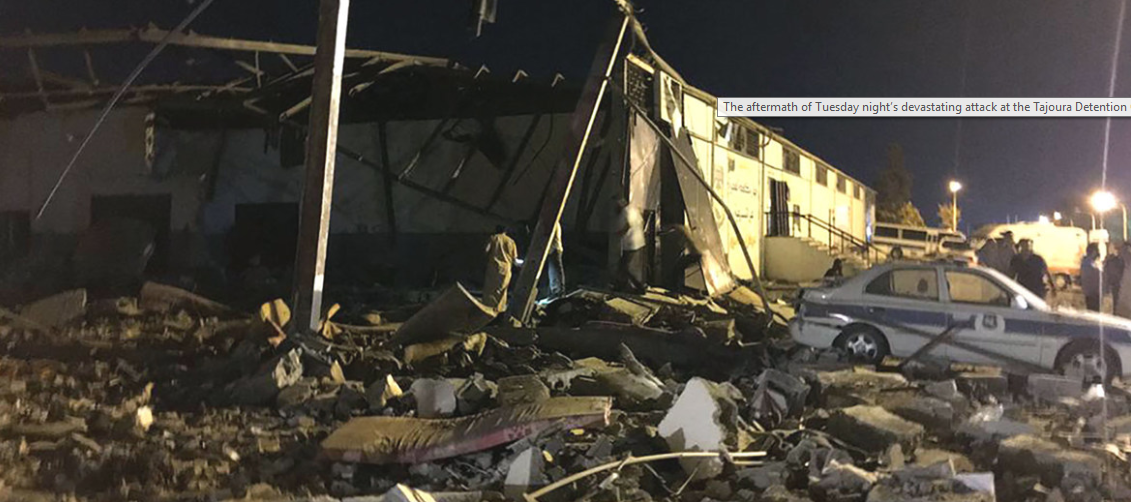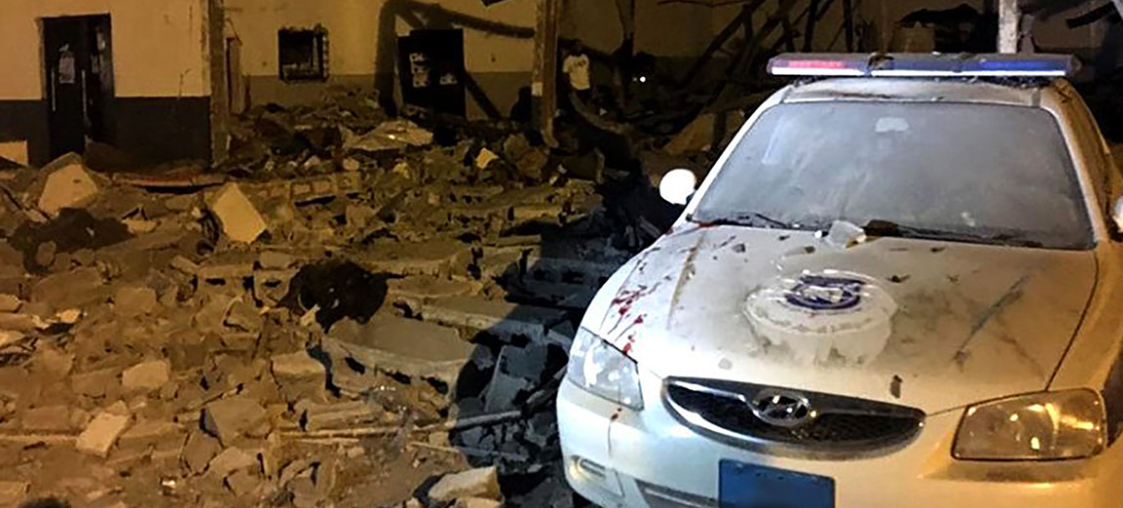According to a UN report, the Tajoura Detention Centre, east of Tripoli, was devastated by a missile attack this past Tuesday. Housing more than 600 women, men, and children, the attack left 44 migrants and refugees killed and more than 130 injured.

UN Secretary-General Guteres released a statement condemning the attack. He referred to it as a “horrendous incident in the strongest terms,” and expressed his condolences. The Secretary-General also called for an independent investigation. He noted that the “UN had provided exact coordinates of the detention center to the parties.” Therefore, he reminded “all parties of their obligations under international humanitarian law to take all feasible precautions to avoid, and in any event to minimize, incidental loss of civilian life, injury to civilians and damage to civilian objects, and to refrain from directing attacks against civilians.”
However, officials from IOM and UNHCR believe that, “Such an attack deserves more than condemnation.” UN High Commissioner, Michelle Bachelet, argued that not only did the parties have knowledge of the coordinates of the detention centre, but they were also aware that it “housed civilians.” As a result, Bachelet asserted that the attack, “may, depending on the precise circumstances, amount to a war crime.” Ghassan Salamé, head of the UN Support Mission in Libya (UNSMIL) and Special Representative of the Secretary-General, was in agreement with Bachelet, reiterating that, “This attack clearly could constitute a war crime, as it killed by surprise innocent people whose dire conditions forced them to be in that shelter.”
Journalists were also not satisfied with the Secretary-General’s sole call for an independent investigation. During a press briefing at the UN Headquarters on Wednesday, one journalist asked the Secretary-General’s spokesman Stéphane Dujarric, if he intended on appealing to the Security Council. Dujarric’s response was that they would “take things one step at a time.” In addition, he stated that it was for the government of Libya to conduct an initial investigation.
The missile strike on the Tajoura Detention Centre is the latest attack amidst the conflict between Libya’s UN-recognized Government and Khalifa Haftar’s forces. According to the World Health Organization (WHO), over 104,000 people in and around Tripoli have been displaced due to similar airstrikes and intense shelling. Additionally, another 3,300 migrants and refugees, like those at Tajoura, are still being held inside and around Tripoli, according to IOM and UNHCR. Michelle Bachelet, UN Human Rights Chief, has insisted that these camps should be closed because of the conditions observed by the UN Staff – “severe overcrowding, torture, ill-treatment, forced labour, rape and acute malnutrition.”
This tragedy also comes just days after Sea-Watch captain, Carola Rackete, was arrested for docking in Lampedusa, Sicily, without authorization by the Italian government. They had refused her entry to the port because of the 41 migrants she had on board after rescuing them from the middle of the Mediterranean Sea. They insisted that the captain should have returned the migrants back to Libya’s port. However, the young captain refused to do so because she knew that the port in Libya was not an option – it is unsafe as Libya is in the middle of a civil war. After spending almost two weeks stranded at sea imploring the Italian government to allow her entrance into the port, Rackete made the decision to enter regardless of their permission. Upon approaching Italy’s port, Rackete hit a boat that was ordered to block her entry. The Sea-Watch captain insisted that it was an accident, but Italy’s interior minister, Matteo Salvini, called it “a criminal act of war.” However, Italian Judge Alessandra Vella ordered Rackete’s release stating that she had respected international law, which meant saving people who were at risk of drowning and transporting them to the safest port, which was in this case, not Libya.

After weeks of controversy about this young captain’s actions, it is clear from today’s tragedy, that Rackete had made the correct choice – a dangerous, but right choice, nonetheless. Had Rackete not followed her own conscience and remained strong and determined, it is possible that she may have succumbed to Italy’s directives and returned the migrants to Libya. It is also possible that these refugees could have ended up at the Tajoura Detention Centre, killed or injured. In essence, Carola Rackete proved to be a selfless hero, determining for herself what was morally right as opposed to what others considered legally wrong.
As we write this article, the UN Security Council is still engaged in talks on the situation in Libya and are undecided on a common message to give as a press statement.












